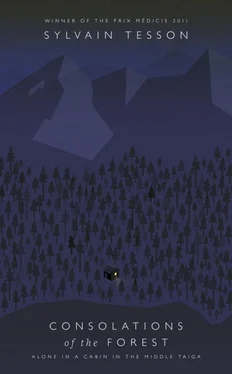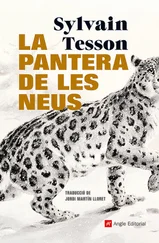Mishima in The Golden Pavilion : ‘…What gives meaning to our life’s actions is fidelity to a certain moment, and our effort to make that moment last for ever…’ Everything we undertake to do would flow from an ephemeral and intangible inspiration; a fraction of a second would establish existence. The Buddhists call them satori , these moments when our consciousness glimpses something that disappears forthwith. Blindly, we attempt to recover it, longing to revive that vanished sensation. Days stream by in this fumbling quest; we wander through and throughout our lives. We advance, butterfly net in hand, hoping to catch what has fled. This attempt to relive the satori, thwarted and revived a thousand times, will drive our efforts until death delivers us from the obsessive desire to resuscitate what has fainted away.
Alas, one cannot bathe in the same lake twice. The satori cannot ever be repeated. A hierophany – a physical manifestation of the sacred serving as spiritual inspiration – visits us only once. Madeleines cannot be reheated. And the shores of Baikal are now too familiar to me to draw the slightest tear from my eye.
5 JUNE
I paddle to the north, as this afternoon draws to a close, with two fishing rods hooked on the gunwales. The bays spread out beaches of pink shingle. The water’s clarity allows glimpses of rocks on which the sun slaps splashes of lagoon brightness. An ice raft slips by with eight seagulls sunning themselves. From out on the lake, I discover the new face of the mountain. The tender green strip of larches supports the greenish-bronze band of cedars coiffed by the bluish-green frieze of the dwarf pines. Surviving patches of granular snow punctuate these lines like commas. The mountains are playing at standing on their heads, and their reflections are even lovelier than the reality. The water’s depth and mystery impart vibrancy to the images, and the trembling of the surface conjures visions at the edge of a dream.
As the prow approaches, the ducks barely manage to lift off. I can paddle up to them without frightening them at all. I beach the kayak on a sandy shore where a torrent falls frothing into the lake. A storm chases me under a cedar, where the dogs rejoin me. The lake is like coal-black flannel pricked by a deluge of needles. In five minutes, the sky clears. Beneath the rainbow, wearing waders, I fish in the current. Ducks brush past me. Shafts of sunshine dab the forest with blond highlights. There is a perfect equilibrium in this distribution of roles played by the mountain, the creatures, the water and the shore.
As if they’d had an appointment, the fish suddenly start biting. In twenty minutes, I catch six char. While the light exhausts itself making holes in the clouds, I lie down on the beach in front of a wood fire, the dogs at my side, the kayak drawn halfway up on shore and, listening to the music of the waves, I watch my fish grill on skewers of green wood, and I think that life ought always to be like this: a homage rendered by humanity to the dreams of childhood. I struggle against the temptation to take a picture.
The sun, as usual, decides to fling its last light over Buryatia.
6 JUNE
Last night, suffering from insomnia, I went out onto the beach with my flare guns. The moon is waning. She’ll be back. Of that we can be sure. You’re better off betting on satellites than on messiahs. In the morning, the air is as joyous and flighty as a Dufy painting. The sound of the waves has invaded my life. The swell on the lake is a song of freedom.
From the top of the talus, the trunks of the pines and cedars frame slabs of flat turquoise down on the lake. A long promenade by the azure shore.
The kayak: the shuttle of a loom, plying back and forth on the warp of Baikalian silks.
After paddling around to correct the defective rudder, I pitch my hammock in the clearing. Looking out, I see the watery plain the heavens use as a mirror to try out different tints of light. ‘I felt a peculiar emotion, observing with what detailed precision earthly things gave refuge to the colours of the sky’ (Mishima, The Golden Pavilion ). I read a few of Cicero’s letters. The hermit, without access to the news of the day, owes it to himself to be up-to-date on the doings of ancient Rome. In The Thousand and One Nights , amid the palms and the opulence, this sentence strikes an unpleasant note: ‘This generosity you’re putting on for me here must surely have a purpose.’ I prefer this homage to gratuity in Gilles , Drieu La Rochelle’s novel about the education of a French fascist between the two world wars: ‘The less direction his life had, the more sense it made.’
7 JUNE
I’m writing at the wooden table; the dogs are sleeping on the warm sand. Everything is quiet, intense and luminous.
At the edge of the beach, anemones in bloom. Bees and wasps are drinking themselves silly there. Why didn’t God, in His infinite wisdom, decree that man would simply and credulously believe in Him, without any fuss or questions? To have invented that perfectly inexplicable thing, the fertilization of flowers by Hymenoptera, and to have forgotten to leave tangible signs of His existence? Gross negligence!
8 JUNE
Barking! I’m up in a flash. In the distance, the sound of an approaching motor. It’s five a.m. and a boat is coming from the south. Through the binoculars I recognize one of Sergei’s small aluminium craft. Fifteen minutes later, he lands in the company of sad-eyed Yura. The tea kettle is on and I’ve set yesterday’s blini out on the table. When they come in, I’m seated and everything is in order. Sergei can’t get over it and talks about ‘the discipline of people who read’. Now there’s something that polishes France’s reputation on the cheap! The cabin sparkles like a Prussian guard post. Sergei hasn’t caught on that, without the dogs, I’d still be snoring.
I must have been an innkeeper in a previous life; I serve my guests with an eagerness tinged with irritation: an impromptu visit is a disturbance as well as a delight. The two men left Pokoyniki yesterday evening, zigzagged among the islands of rubble ice, and are heading for Elohin. This year they are the first to navigate the lake after the débâcle in May. Sergei treats me to a chronicle of the treachery and rancour displayed by the inspectors of the guard posts. The critical theory of the desiccation of the human soul by modernity – formulated by Ralph Waldo Emerson and Jacques Ellul and later taken up by Julien Coupat and others nostalgic for the bonds of community – does not hold up. It isn’t crowding in the urban park that breeds nastiness, nor is it the stress provoked by market pressures that transforms men into snarling rats, nor is it the mirror-image rivalry of living cheek-by-jowl that ‘commands brothers to hate one another’ (Coupat in Tiqqun ). At Baikal, separated by dozens of miles of shoreline, living among the wonders of the woods, men tear one another apart like next-door apartment-house neighbours in a vulgar megalopolis. Change the venue, and the nature of the ‘brothers’ will stay the same. The peacefulness of the setting won’t mean a thing. Man can’t remake himself in a different image.
Sergei pays me the best compliment of my life: ‘Your presence here puts off the poachers. You’ll have saved four or five bears.’ We lubricate these courtesies with a bottle of vodka. Yura, feeling unsociable, says nothing, doesn’t drink, and hangs back, now and then dispatching an onion or a smoked fish. The two men take off for Elohin where they have things to do and we arrange to meet that evening at Zavorotni, where they’ll be spending the night.
We’ve emptied the bottle, but fifteen miles in a kayak will put paid to any migraine. I paddle slowly, dawdling in the bays. I move at an otter’s pace and the prow slices through hours of silence. Bek and Aika are a little black dot and a little white dot at the mouths of the torrents. A marsh-hawk studies me from the top of an ash tree. The mergansers cackle. I cut across the capes a little over a mile from their shores. Six hours later, Zavorotni. Sergei, Yura and a few fishermen are sitting by a fire in front of the large izba belonging to their friend V.M.
Читать дальше












